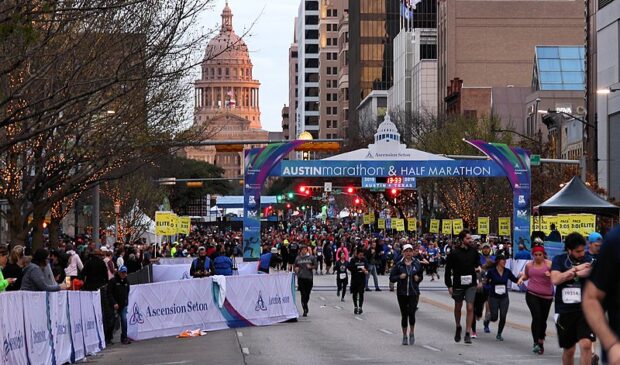About the Author
Chad Swiatecki is a 20-year journalist who relocated to Austin from his home state of Michigan in 2008. He most enjoys covering the intersection of arts, business and local/state politics. He has written for Rolling Stone, Spin, New York Daily News, Texas Monthly, Austin American-Statesman and many other regional and national outlets.
Newsletter Signup
The Austin Monitor thanks its sponsors. Become one.
Most Popular Stories
- Council members celebrate unanimous defeat of bill that proposed putting Austin under state control
- A once-banned type of building is back in favor – and the Planning Commission approves
- Eviction crisis spreads as affordability pressures worsen
- Austin churches answer prayers for affordable housing – by building it themselves
- East Austin’s ‘wishbone’ bridge takes shape as concrete beams almost span Lady Bird Lake
-
Discover News By District

Tourism Commission looks at how city can welcome more major events
Monday, July 29, 2024 by Chad Swiatecki
The Tourism Commission has indicated it may ask the city to be more hospitable toward major events that can bring large numbers of visitors to the area. Areas they could focus on include the availability of major gathering areas in the downtown core, working to allow more street closures and other possible disruptions to accommodate large productions, and generally finding ways to meet the needs of major companies interested in spending millions of dollars locally.
At its most recent meeting, the commission heard from Ben Blocker, director of events for local event and festival producer C3 Presents, who shared his experience producing large events in Austin as well as other major U.S. cities where he said local leaders tend to be more enthusiastic and accommodating. Blocker said the CMT Music Awards, which have filmed at the Moody Center for the past two years, eliminated its downtown activation on Congress Avenue in front of the state Capitol this year because of difficulties with road closures and securing enough police officers as required by the city.
“Everything in Moody looked spectacular. Everything on Congress looked spectacular. The pain points of getting there were difficult and worth sharing because I think there are things that we can all do better to make these type of events want to come back, which was not the feedback I was getting in the moment,” he said, noting that CMT’s former host city of Nashville has earned a national reputation for advance problem-solving and making events easy to produce. “There are a lot of little things that to a big events company or sports league or whatever it may be like CMT, it came down to things that seem like nickel-and-diming.”
Blocker said the pace of construction throughout downtown has eliminated many parking lots and other areas that for many years had offered bandwidth to put on sponsored events downtown, making it important for the city to find ways to allow more events at Auditorium Shores or other locations that may require cooperation of multiple city departments.
“There’s only a certain amount of spots available each year at a place like an Auditorium Shores or closing streets downtown, but I think the very outspoken voices of a few that may not want those things probably tip the scales in the wrong direction,” he said. “With supporting services, everyone understands those and we want to pay our firefighters, we want to pay our police, but we don’t want to climb a mountain to get through that process. Sometimes just getting the pricing, getting the numbers that are needed can be like pulling teeth.”
Commissioner Ed Bailey said Blocker’s feedback will be helpful in looking at how the city and the Austin Convention Center can structure their deal-making process to improve the chances of large conventions and events choosing Austin over other large cities.
“One of the things that is really important in the conversation with teams that try to win conventions to their destination – there’s a pretty sophisticated playoff between cities that the convention holder pushes the designated cities that are on the short list to bid each other out until they get what they want and it all comes together,” he said. “One of the conversations we’re having about the convention center expansion is based around that competition and how hard it is to get the right scale of conference in the city. Their challenge has been, at one point there weren’t enough hotels to take on a huge booking and they couldn’t compete with Vegas.”
Chair Daniel Ronan said he’d like to push the city to find ways to lower the costs and timelines for producing major events that can lead to more business for local hotels and generate more Hotel Occupancy Tax revenue.
“If the city can’t deliver on its own requirements, then maybe we should reassess and be more flexible and not stating a nonnegotiable and try and work with folks that are trying to come into town and bring this investment,” he said. “Every city is doing this across the country, so the ways that we can make it easier is something to think about and reflect upon as we interlay topics in tourism.”
Photo made available through a Creative Commons license.
The Austin Monitor’s work is made possible by donations from the community. Though our reporting covers donors from time to time, we are careful to keep business and editorial efforts separate while maintaining transparency. A complete list of donors is available here, and our code of ethics is explained here.
You're a community leader
And we’re honored you look to us for serious, in-depth news. You know a strong community needs local and dedicated watchdog reporting. We’re here for you and that won’t change. Now will you take the powerful next step and support our nonprofit news organization?







